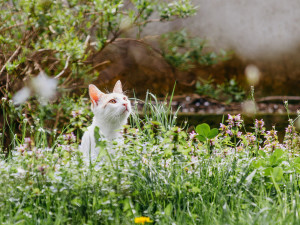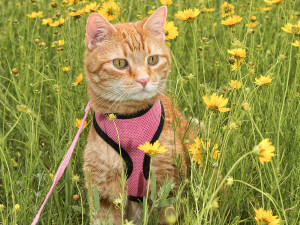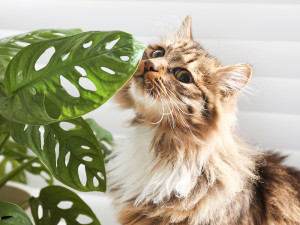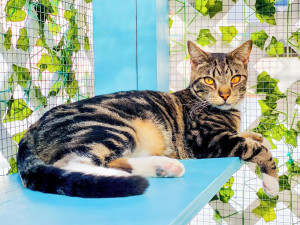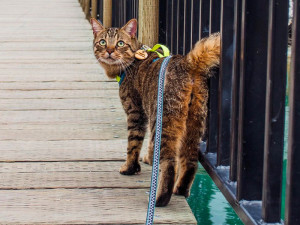Keeping Cats Cool in Summer: Essential Safety Tips for Your Feline Friends
And other summer safety tips.

share article
We’re not the only ones desperate to go outside and get some sun this season. Your cat has big plans for the summer that include getting some time in on that sunbaked windowsill, lazing away the long days, and maybe even donning a harnessopens in a new tab for a warm summer walk. But before you let your summer cat catch some rays, you’ll want to read up on how to be a responsible cat parent in the summer months.
How can I keep my cat safe during the summer?
So, how can you keep your cat safe this summer? Here, the top five cat summer safety tips from a vet.
Protect cats against fleas.
You wouldn’t go outside in the summer without slathering on SPF. Your cat needs protection, too — though not so much from the sun. Applying regular flea and tick preventives prevents your kitty from becoming parasite catnip.
“While they are important year round for outdoor cats, preventives are essential in the summer when flea and tick populations are at their peak,” says Dr. Zarah Hedge, vice president and chief medical officer at the San Diego Humane Society. Fleas can spread disease, and it’s not only your cat who’s at risk. “Cats with fleas can transmit a bacterial infection called ‘cat-scratch fever’ (sounds awesome) to people by scratching themselves, then scratching their owners. The best thing to protect your cat’s health — and yours — is to put them on flea preventives.” Not convinced? Fleas and ticks can jump from your cat to your carpet, couch, bedding…and infestations are not easy to stop.
Avoid pest poisons.
Chipmunks, mice, snakes and other slithering, scampering creatures your cat would love to get their paws on are abundant in the summertime. You might be tempted to put out rodent traps, but the same poisons that kill rodents can be just as fatal for your cat. Pest poison can cause coughing, trouble breathing, diarrheaopens in a new tab, vomitingopens in a new tab, bleeding from the nose or rectum, and death. “Humane, non-lethal pest control methods, including live traps, are a safer option,” Dr. Hedge says. But even if you steer clear of rodenticides, your neighbors may use them. If you notice signs of illness, Dr. Hedge suggests taking your cat to the emergency vetopens in a new tab.
Eliminate toxic plants.
Before choosing plants and flowers to add a pop of color to your garden, remember that a lot of them — including lilies, tulips, azaleas, and gladiolus — are toxic to catsopens in a new tab. They can cause symptoms that run the gamut from vomiting and seizures to kidney failure and heart attacks. Even if you don’t think your cat will be tempted to treat your garden like a salad bar, Dr. Hedge suggests avoiding growing these toxic plants just in case. “Dogs tend to be more indiscriminate eaters than cats, but kittens can be very exploratory and are more likely to get into trouble,” she says.
What Are Common Summer Dangers for Cats?
The main thing you want to think about is how to keep your cat cool in the summer: Heat stroke is common in cats in the hot weather and it can even be life-threatening. Other common summer dangers include the above — fleas, pest poisons, and toxic plants. There’s also a higher risk of trapped and lost cats: because it’s lighter out longer, cats may stray further than usual or try to find shade in an unusual place where you can’t find them.
What are the signs of heatstroke in cats?
Too much fun in the sun can cause cats to over heat and put your cat at risk for heatstroke. Brachycephalic breeds, like Persian, Himalayan, and Burmese cats, often have trouble breathing due to their flat, “smushed” facial structure, and getting overheated can make it worse. “When dogs get hot, they pant to cool down,” Dr. Hedge says. “Cats are obligate nasal breathers, so panting is not normal behavior — it means they are really hot.” Here are signs of heatstroke in cats:
Panting, which can progress to distressed breathing
Restlessness and pacing
Seeking shade or water
Red gums or tongue
Increased heart rate
Vomiting or diarrhea
Lethargy, confusion, weakness, and seizuresopens in a new tab are signs of advanced heatstroke. Bring your cat to a vet immediately if you witness these.
How can I prevent my cat from overheating?
To prevent overheating, keep your home at a safe temperature for cats indoors in the summer, and make sure it’s air-conditioned on warm days. If you have an outdoor cat, consider installing a pet door so they can retire inside if it gets too hot out. Providing access to cool water and shady spots will help, too.
How can I keep my cat hydrated in hot weather?
It’s important to keep your cat hydrated in the hot summer months: Make sure you keep your cat’s bowl replenished regularly with fresh water. Many cats love moving water — you can get them a water fountain to encourage them to drink more. If you’re traveling, make sure you bring a bowl and keep your cat hydrated on the road.
FAQ (People Also Ask):
Can I let my cat roam freely outside during the summer?
You can, but know that in addition to the normal risks of getting hit by a car, predators and pests, cats are more likely to get trapped or lost outside in the summer.
Can I take my cat on car trips during the summer?
As long as you ease your cat into car rides by starting out with shorter ones and take the necessary safety precautions such as putting them in a carrier, yes.
References
Ontario Medical Veterinary Association Summer Safety Tips for Catsopens in a new tab
Pet Food Institute Summer Safety Tips for Your Petopens in a new tab
Feline Safety Tips from Friends for Life Animal Rescue, Gilbert AZ opens in a new tab
Sacramento SPCA HOT WEATHER SAFETY TIPS FOR PETSopens in a new tab
Royal Veterinary College Heatstroke in Cats and Dogs opens in a new tab
Pet Food Institute Summer Safety Tips for Your Petopens in a new tab

Jodi Helmer
Jodi Helmer is a North Carolina-based freelance writer who shares her home with an embarrassing number of rescue dogs and relies on four feral cats to patrol the barn. When she isn’t refilling food and water dishes, Jodi writes about animals for Scientific American, Sierra, WebMD, AKC Family Dog, Living the Country Life, and Out Here.
Related articles
![Uncomfortable looking gray cat sitting on a window sill]() opens in a new tab
opens in a new tabShould Your Cat Go to the ER?
Here are six good reasons to haul tail to the emergency room.
![cat sniffing a plant]() opens in a new tab
opens in a new tab10 Plants Toxic to Cats
These plants might be beautiful, but they’re deadly to feline foragers.
![A Burma breed cat on a leashed harness sitting near a feet of a girl at a pedestrian crossing.]() opens in a new tab
opens in a new tabHow to Walk Your Cat on a Leash
Adventure Cats author Laura Moss’s step-by-step guide for hitting the streets with your cat.
![Cat sitting on a sky blue ledge with plant vines in the background]() opens in a new tab
opens in a new tabHow to DIY a Catio
Cat behaviorist Cristin Tamburo’s tips for building a safe outdoor space for your cat.
![adventure cat walking on a bridge in harness and leash]() opens in a new tab
opens in a new tabCould Your Cat Be an Adventure Cat?
How you can train your cat to explore the great outdoors.
